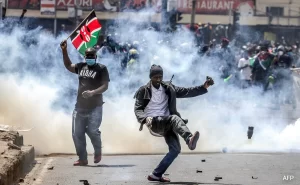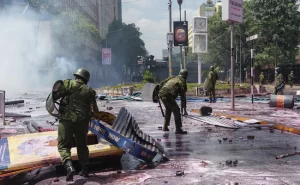In summary
- He stated that the protests against his policies, which he considered legitimate, had been taken over by an organized group of criminals. He warned that his government would use all available means to prevent similar violence from happening again, no matter the cost.
- He also emphasized that the events of that day were a turning point in how they deal with threats to their peace and that they would work to ensure that such a situation would not occur again.In summary, he stated that the protests against his policies, which he considered legitimate, had been taken over by an organized group of criminals.
- He warned that his government would use all available means to prevent similar violence from happening again, no matter the cost.
- He also emphasized that the events of that day were a turning point in how they deal with threats to their peace and that they would work to ensure that such a situation would not occur again.
After a day of protest, turmoil, and bloodshed, Kenyan President William Ruto addressed the nation with a message of sadness and strength. He stated that “legitimate” protests against his policies had been “hijacked by a group of organized criminals” and warned that his government would use all means possible to prevent a repeat of the violence, “at whatever cost.”

photos courtesy

photos courtesy- Aftermath of demonstrations in Kenya
“Today’s events represent a crucial moment in our response to threats to our peace,” he said. “We are committed to preventing a recurrence of this nature.”
The president’s message was an attempt to regain control after days of increasing and widespread street protests. On Tuesday, the situation intensified with at least five people shot dead and hundreds injured. However, some close to Mr. Ruto are concerned that the situation may not be as straightforward as it seems, and tough decisions may lie ahead.
After being elected in 2022 with promises to combat corruption, stabilize the country’s struggling economy, and assist the underprivileged, Mr. Ruto now confronts an unprecedented backlash against a bill that he considers essential for the nation’s development. It would be easier to navigate if the opposition he faces were limited to parliament.
Known for his political acumen, Mr. Ruto, who served as deputy president for almost a decade before assuming the top position, has extensive experience in navigating politics to achieve goals. However, the current opposition is beyond his control. What started as discontent expressed on social media has evolved into a powerful grassroots movement, filling the streets of towns across the country.
Today in the capital city, Nairobi, the governor’s office, city hall, and the country’s parliament were set on fire by protestors. The demonstrators had threatened a “total shutdown” earlier in the day, and their actions have caused chaos and panic across the country. The protests have been met with teargas and, at times, live fire from the police. It’s clear that their anger has been heard. In response, Mr. Ruto has chosen not to give in to the protestors’ demands by abandoning his budget. Instead, he has pushed back against them in an attempt to calm the country.
Some in the government might question whether this position can be sustained and how it will affect the controversial finance bill in the long run. Mr. Ruto has argued that the new taxes are necessary to manage Kenya’s debt, which exceeds $80 billion (£63 billion) and costs the country more than half of its annual tax revenues to service. Earlier this year, Kenya successfully renegotiated its international debt commitments, leading to an immediate increase in the value of its currency.
Mr. Ruto, who is considered one of Africa’s leading statesmen, recently visited the White House and understands the importance of his nation avoiding a default on its debt payments. Rather than cutting public services, it was decided by his government to control state finances by increasing the tax burden. The bill, set to become law next Monday, initially proposed many new or increased taxes on items such as car ownership, financial transactions, and sanitary pads.
Following public consultation, several of the most controversial taxes have been removed. However, the budget’s controversy stems from other revenue-raising measures introduced by Mr. Ruto, including increased taxes for healthcare and low-cost housing. For those on the street, there’s a third solution available to the government beyond cutting services or raising taxes.
By Janet Namalwa
